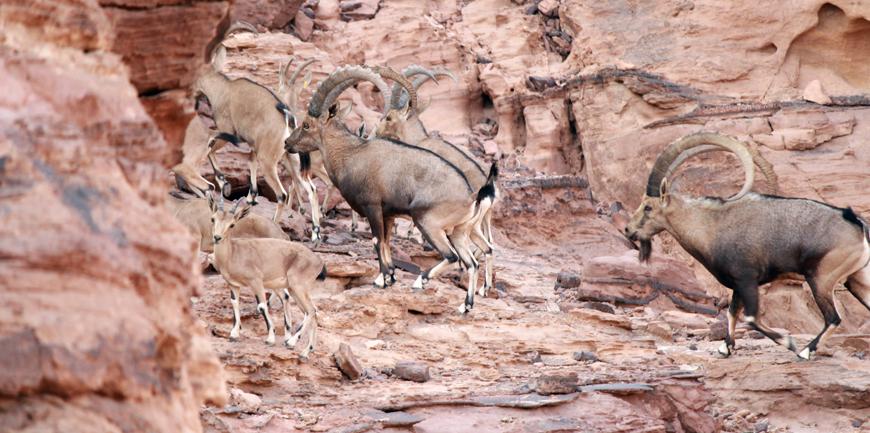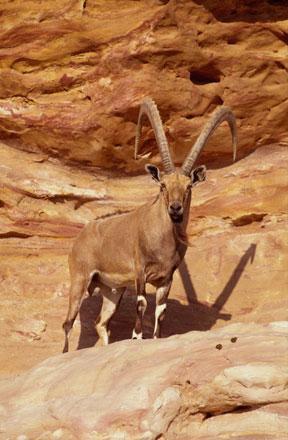You are here
60 ibexes released into the wild in Wadi Rum
By Bahaa Al Deen Al Nawas - Oct 24,2015 - Last updated at Oct 24,2015

Ibexes which were released to live in Wadi Rum on Thursday (Photo courtesy of the Wadi Rum Nature Reserve)
WADI RUM — Sixty ibexes were released to the wild last Thursday in Wadi Rum as part of Jordanian-Emirati cooperation under the Sheikh Mohammed Bin Zayed Al Nahyan Ibex Reintroduction and Release Programme.
The project transferred 100 ibexes to the Wadi Rum Nature Reserve in 2014, which remained in a controlled environment in order to adapt to the new habitat before being released to live in the wild.
Ibexes are wild goats that live in the mountainous regions of Europe, north central Asia and northern Africa, which have long, curved horns and cloven hooves, according to web sources.
Shaikha Al Dhaheri, executive director of the terrestrial and marine biodiversity sector at the Environment Agency-Abu Dhabi (EAD), attended a ceremony that preceded the release of the wild animals to familiarise the local community with the project, launched by Sheikh Mohammed Bin Zayed Al Nahyan, crown prince of Abu Dhabi and deputy supreme commander of the UAE armed forces.
Suleiman Njadat, environment commissioner at the Aqaba Special Economic Zone Authority (ASEZA), commended the EAD for its efforts to protect the ibex, which is an endangered species.
During the ceremony, attended by several elders and notables of Wadi Rum area, Dhaheri said this project to reintroduce the ibex and a 2008-2014 project to reintroduce the oryx in Rum area — at a cost of $1.8 million — represent the UAE’s role and commitment to preserve natural heritage.
She said EAD’s role is not limited to protecting species on the verge of extinction and increasing their numbers, but extends to involving the local community in the area by offering support and job opportunities through sustainable development and ecotourism programmes.
The ceremony also featured a play performed by students from Al Salhiya School that encouraged taking care of animals as well as a musical performance by Maan Band for Popular Arts.
At a press conference after the ceremony, Njadat said, answering a question on the poaching of ibexes, that there are plans to establish a section in the Wadi Rum reserve to raise awareness of the project’s importance.
Dhaheri told reporters that a plan was prepared by specialists and experts from the UAE, the Royal Society for the Conservation of Nature and ASEZA to identify the number of ibexes that Wadi Rum can absorb.
She said when the animals’ basic needs are met, they can survive, stressing the importance of also communicating with the local community to ensure the ibexes’ protection and prevent hunting.
Dhaheri said satellite tracking devices were installed on 10 ibexes in order to study their movements, and any disruptions in transmission will be caused by natural death, a malfunction, or someone targeting the herd.
The tracking system will facilitate the monitoring of areas where violators access the herd, she added, noting that one of the 2.8 million UAE dirham (around JD540,558) project’s plans is to improve the status of the ibex from “endangered species” to “threatened species”.
Nasser Zawaideh, director of the Wadi Rum Nature Reserve, said the reserve will install solar-powered surveillance cameras to record violations.
Nonetheless, Zawaideh noted that the reserve’s size stands at 720 square metres which makes it very hard to monitor everything, noting that an agreement has been reached with the Rangers and other security parties to enforce the law and assist in the protection of the animals in the reserve.
Dhaheri highlighted the benefits of the project for tourism.
“Ecotourism already exists, and the ibex release project only enhances... international and local tourism. We hope the projects increase economic income through involving the local community,” she told reporters.
The Emirati official said the project will end in 2016, but the partnership will continue through follow-ups and exchange of expertise.
The EAD targets endangered species around the world and seeks to put them in their natural habitat, she said, adding that there is another project to reintroduce and release the African oryx in Chad, as well as other similar projects inside and outside Jordan.
After the herd of 60 ibexes were released, Dhaheri told the Jordan Times that she felt like she was at a national celebration in the presence of the authorities and local community representatives, and voiced hope that the released animals will live a safe life and reproduce in Wadi Rum, inscribed on the UNESCO World Heritage List in 2011.
Local community members said they are looking forward to see the release of the remaining 40 ibexes in 2016.
Related Articles
AMMAN — The Royal Society for the Conservation of Nature (RSCN) and Environment Agency-Abu Dhabi (EAD) have signed a memorandum of understan
AMMAN — The Royal Society for the Conservation of Nature (RSCN) on Sunday received 60 Arabian Oryx coming from the UAE. The move, part
AMMAN — Authorities are analysing a recent video which appears to show Nubian ibexes being killed in the Mudawarra area in the south of Jord















